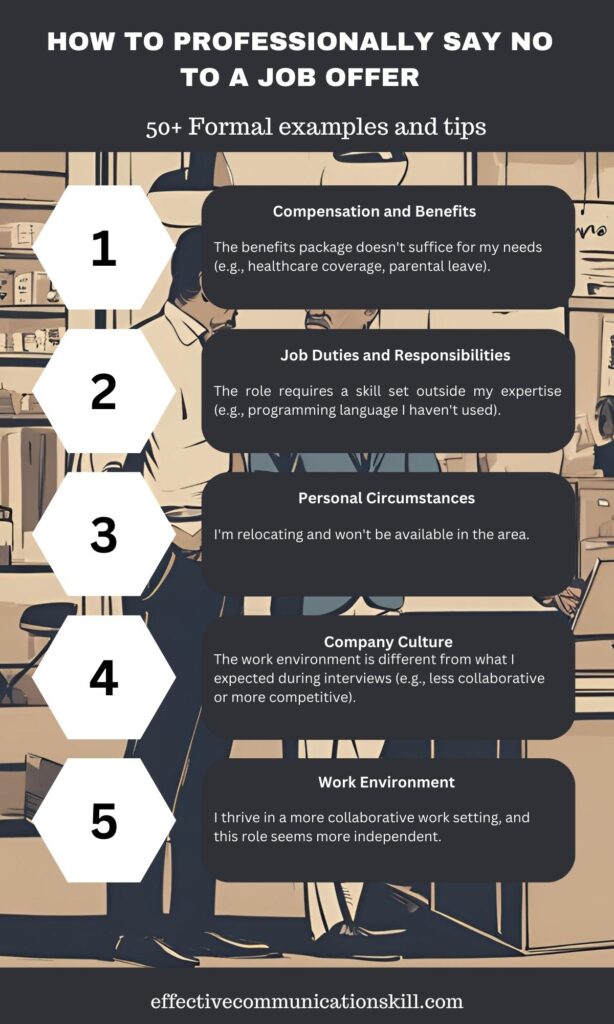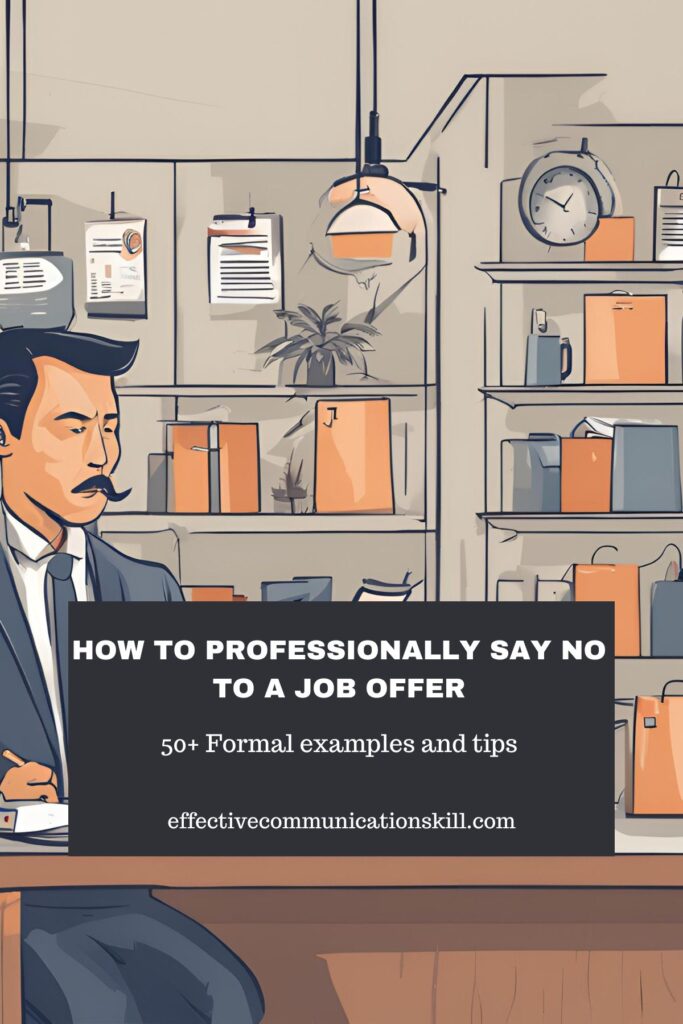How to professionally say no to a job offer
Landing a dream job is fantastic, but what if the interview process leads to an offer that isn’t quite the perfect fit?
Even the most meticulous job search can result in unexpected offers. While securing an offer is always a positive sign, gracefully declining a position that doesn’t fully align with your needs is crucial. This demonstrates your professionalism and respect for the employer’s time.
Here’s how to navigate this situation effectively, ensuring you leave a positive impression that could open doors for future opportunities.

How to Professionally Say No to a Job Offer
Here are some key steps to ensure your rejection is courteous and clear:
Express Gratitude: Thank the hiring manager for their time and consideration. “Thank you for offering me the [Job Title] position. I appreciate your time and effort throughout the interview process.”
Communicate Clearly: State your decision to decline the offer directly. “After careful consideration, I’ve decided to decline the offer at this time.”
Be Brief (Optional): You don’t need to go into extensive detail about your reasons for declining. However, a brief explanation can be helpful. For example:
- “I have accepted another position that aligns more closely with my current career goals.”
- “Upon further reflection, I believe this role wouldn’t be the best fit for my skill set.”
Express Positivity: Wish the company well in their search. “I wish you all the best in finding the perfect candidate for the role.”
Maintain Professionalism: Remain courteous and professional throughout your communication.
50+ Ways to Professionally Say No to a Job Offer (Examples)
Here are various ways to express your decline politely and professionally, categorized by common reasons for rejection:
Compensation and Benefits
- The salary offer falls below my expectations.
- The benefits package doesn’t suffice for my needs (e.g., healthcare coverage, parental leave).
- The compensation structure doesn’t fit my career goals (e.g., heavy focus on commission vs. salary).
- The offered salary isn’t competitive for the position in the current market.
- The benefits package doesn’t align with my current situation (e.g., lack of childcare options).
- The overall compensation offer doesn’t match my qualifications and experience.
- The bonus structure doesn’t incentivize the work I’d be doing.
- The paid time off (PTO) policy doesn’t meet my needs.
- The lack of retirement plan options is a concern for my long-term goals.
- The compensation package doesn’t reflect the cost of living in the area.
- The commission structure seems unclear and lacks transparency.
- The stock option package doesn’t align with my risk tolerance.
Want to know? HOW TO SAY NO WORRIES PROFESSIONALLY AND POLITELY? (50+ EXAMPLES AND TIPS)
Job Duties and Responsibilities
Here are some examples on How to professionally say this job is not for me:
- The role requires a skill set outside my expertise (e.g., programming language I haven’t used).
- The day-to-daily tasks don’t align with my career aspirations (e.g., more administrative work than I expected).
- I’m seeking a position with more [specific responsibility] (e.g., project management vs. individual contributor role).
- The responsibilities don’t match what was discussed during the interview process.
- The role lacks the growth opportunities I’m seeking (e.g., limited training or advancement options).
- The role seems too specialized for my desire to work in a broader area.
- The travel requirements are more extensive than I anticipated.
- The workload seems overwhelming based on the job description.
- The role requires working weekends or evenings more frequently than I’d prefer.
- The opportunity for professional development seems limited.
- The company culture seems to prioritize long hours, which doesn’t suit my work-life balance.
- The role involves tasks I’m not comfortable performing ethically.

Company Culture and Work Environment
- The work environment is different from what I expected during interviews (e.g., less collaborative or more competitive).
- I’m looking for a more [specific company culture aspect] work environment (e.g., innovative or purpose-driven).
- The company culture doesn’t resonate with my work style (e.g., fast-paced vs. detail-oriented).
- The work environment seems fast-paced for my current preferences.
- I thrive in a more collaborative work setting, and this role seems more independent.
- The company dress code is more formal than I’m accustomed to.
- The office location isn’t ideal for my commute or personal situation.
- I heard about a recent merger or acquisition that raises concerns about company culture.
- The lack of diversity and inclusion initiatives is a concern for me.
- The online reviews of the company culture don’t align with my expectations.
- The interview process itself gave me some insights into the work environment that aren’t ideal for me.
- The company seems to be undergoing a lot of change, which creates uncertainty.
- The lack of remote work flexibility is a dealbreaker for me at this point in my career.
- The company’s environmental or social responsibility practices don’t align with my values.
Personal Circumstances
- I have a personal situation that requires my immediate attention (e.g., family health issue).
- I’m relocating and won’t be available in the area.
- I’ve accepted another position that aligns better with my needs (e.g., closer to home or offering a flexible schedule).
- Unfortunately, a personal matter prevents me from accepting the offer at this time.
- My family situation requires me to stay in my current location.
- I’ve received another offer that better suits my personal needs (e.g., childcare options).
- I need to take a break from full-time work for personal reasons.
- I’m going back to school and won’t be available for a full-time position.
- I’ve been offered a leave of absence from my current employer, which I’m choosing to pursue.
- There’s been a change in my childcare arrangements that limits my work availability.
- I need to address an unexpected health issue that requires time and focus.
- I’m considering a career change and need more time to explore other options.
- I recently purchased a home in a different location, making relocation impractical.
- I’ve been offered the opportunity to travel extensively for another company.
- There’s been a personal development opportunity that requires my full attention.
Crafting the Perfect “No” Email: Examples and Tips
While the examples above provide a good starting point, personalizing your message can make a big difference. Here are some tips to tailor your email and additional examples:
- Be Specific (when appropriate): If compensation is the issue, you can say “The salary offer falls below my expectations for this role, given my [mention relevant skills or experience].” However, avoid going into excessive detail, especially regarding a competing offer.
- Express Interest in Staying Connected: If you’re open to future opportunities, you can add, “I would be happy to stay connected and learn about future openings that might be a better fit for my background.”
- Keep it Positive: Even if the role wasn’t ideal, thank the company for their time and professionalism.
Here’s an example combining elements from different categories:
Dear [Hiring Manager Name],
Thank you very much for offering me the [Job Title] position at [Company Name]. I truly appreciate the time and effort you invested in interviewing me and learning more about my background.
After careful consideration, I’ve decided to decline the offer. While the role itself is interesting, the [reason for rejection, e.g., compensation package, company culture] doesn’t fully align with my current career goals and priorities at this time.
I wish you and the team all the best in finding the right candidate for the position.

Conclusion
Remember, professionalism is key throughout this process. By following the steps and examples outlined above, you can effectively decline a job offer while maintaining a positive relationship with the employer. This can open doors for future opportunities that might be a better fit down the line. So, take a deep breath, express your gratitude, and decline the offer with confidence!
